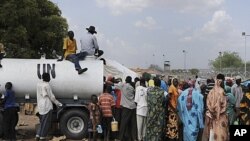U.S. Sudan envoy Princeton Lyman said Friday the process of dividing that country into two independent states is "still fundamentally on track" despite territorial and economic disputes. Lyman is heading to the region for last-minute diplomacy before South Sudan becomes independent July 9.
Lyman says the political atmosphere surrounding the birth of the new state is by no means as promising as it seemed when the southern Sudanese voted to become independent in January.
But he says the political process is "still fundamentally on track" and that he expects the north and south to be able to forge workable, if not cordial, relations after July 9.
Lyman met reporters after convening an unusual meeting of the Washington diplomatic corps Friday to rally international support for a peaceful secession process.
A written statement said Lyman asked for help in encouraging the Khartoum government and southern leaders to resolve outstanding issues, and urged them not to miss the "historic opportunity" to start a new chapter in Sudanese history.
The senior U.S. diplomat said he doubts disputes over the contested Abyei and Southern Kordofan regions, and differences over sharing oil revenues, can be ironed out by July 9 but said north-south relations need not be hostile.
"These are two states that have emerged from civil war," Lyman noted. "But as long as they have made the commitment not to go back to war, yes the relationship will be rocky at times. They'll argue very strongly over some issues. There may even be a clash here or there. It could happen. But I think it's so much in the interests of the two sides to find a way to live together, that I think that will be the dominant process."
Lyman is to fly to Addis Ababa Saturday to join in an East African summit being convened by Ethiopia to support peace efforts, and later will go to the southern Sudanese capital Juba for last-minute pre-independence diplomacy.
Sudan expert Jon Temin of the United States Institute of Peace says the violence over Abyei and Southern Kordofan is disheartening, and that it does not look like the two Sudans will have a "particularly positive" relationship.
None-the-less, he said, the successful completion of Sudan's six-year peace process is still a reason to celebrate.
"I think it's important to recognize and to celebrate the birth of this new country," Temin said. "This is a goal that has been held by southern Sudanese for decades and it's really the realization of a dream in many ways. But on both sides of the borders there are deep and concerning questions that remain unaddressed and you could see weak states on both sides. It's not just the south where the state may be born weak. I think the concerns in the north are as substantial or greater than in the south."
Temin cautioned that Western leverage with the Khartoum government may diminish with the peace process completed.
He said the north may doubt the Obama administration's ability to deliver on a so-called "road map" to normal relations if it adheres to peace terms.
However, Sudan envoy Lyman, in his remarks to reporters, said the U.S. offer remains solid.
"The fact is - and I can be very clear on this - the administration is very committed on the road map, very specifically so," Lyman added. "And part of my trip is going to be to reinforce that. The [U.S.] president has taken the steps that he promised to take, and he fully intends to follow though, if they follow through on the conditions in the road map."
In return for Khartoum's cooperation, the administration has offered, among other things, to take Sudan off the U.S. list of state sponsors of terrorism, and to help expedite badly-needed debt relief for the north.
US: Sudan Peace Process 'Fundamentally on Track'




